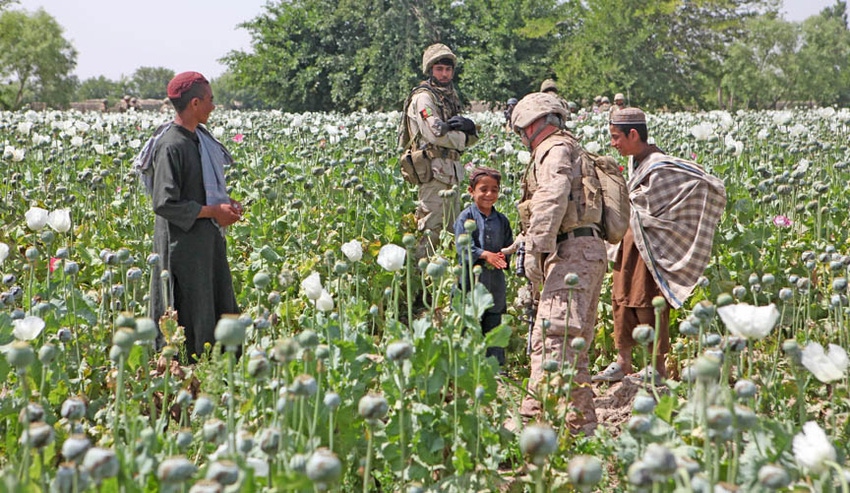August 5, 2013

Wars come and go in Afghanistan; opium remains. Twelve years after their purported fall from power, the Taliban appear to be thriving — and ready to reap millions in profit from a record opium crop. It’s no happy-in-hell illusion; the Taliban brought in approximately $100 million in 2012 from the opium trade, and 2013 looks even greener. Opium has become the Taliban’s cash cow, and the beast is fatter than ever.
Opium is currency to cash-parched farmers in Afghanistan. Ingestion, injection, or inhalation — the drug demand is faithful for opium and its derivatives, particularly heroin. The fields of Afghanistan may supply 90 percent of the world’s heroin. Poppy acreage is surging — possibly 500,000 acres will be harvested in 2013.
The United States (and the UK as well) has spent millions to encourage Afghan farmers to plant legal crops, and the effort has been an absolute money pit. Cotton and wheat don’t compete with poppy — especially as Western combat troops prepare to leave and a legal economy threatens to collapse. From the BBC: “The Afghan government estimates that in 2011, the livelihoods of some 191,500 rural households depended on the growing of illicit drug crops, primarily opium poppy.”
Raw opium paste doesn’t just bring a higher price than food crops; it also stores far more easily. When the red petals fall before a labor-intensive harvest, a capsule is left behind on the stalk. The capsule, or pod, is gravid with an oozing white paste. The gum-like paste is removed with a scraper tool and stored without difficulty. The paste will be dissolved in boiling water, strained and pressed into bricks of morphine. The entire storage and manufacture process can be done on-site, in the “field.” After that, the morphine bricks are shipped to a lab where they’ll be chemically altered into heroin.
As the wheels of Afghanistan’s opium industry spin, the Taliban is reaping an unprecedented harvest. From Newsweek: “Taliban leaders … are a lot richer than they used to be just a few years ago — and the source of their sudden influx of wealth is no secret in Afghanistan and Pakistan.”
Promotion, finance and protection — the Taliban are top-to-bottom at every level of the drug trade. As Ghulam Muhammad Woror, director of narcotics control in Afghanistan’s Helmand province, told Newsweek, “Drugs are ultimately providing the money, food, weapons, and suicide bombers to the insurgency and the good life to Taliban leaders…”
Narco-state
Despite the outward display of extreme moral piety, the Taliban have always been involved with the opium trade, primarily through a 10 percent extortion tax — protection money. But the days of squeezing farmers for 10 percent are gone, eclipsed by the Taliban’s total immersion into opium. They offer seed, fertilizer, advance payments, protection from groundbreaking to harvest, and farm gate collection. The Taliban “… appear to be increasingly engrossed in both the upstream and downstream sides of the heroin and opium trade — encouraging farmers to plant poppies, lending them seed money, buying the crop of sticky opium paste in the field, refining it into exportable opium and heroin, and finally transporting it to Pakistan and Iran, often in old Toyotas to escape detection.”
The prospects are bleak for any diminishment in Afghanistan’s opium flow; the trade current is only getting swifter. Will it be cotton, wheat or poppy covering Afghanistan’s future fields? The answer is already in — just follow the money.
Follow me on Twitter: @CBennett71
Blog archive
Buffalo bone fertilizer — forgotten days of agriculture
Agriculture waiting on Silicon Valley moment
Brad Kelley, the farm boy with 1 million acres
Pigeon racing the new sport of kings
Agriculture apocalypse just around bend, again
DIY biotech a glowing minefield for USDA
Meteorite find a golden harvest for farmer
Wild dog plague crushing livestock industry
Days of wine auctions and gay marriage
Agriculture's burden of technological intolerance
Nuggets of wisdom from the March Against Monsanto
Farmer’s death puts national focus on killer bees
Cliff Young — the farmer who outran the field
Wine skeptic takes on climate change report
PETA drones a trophy prize for US hunters
Biggest wine hoax in history reveals trade secrets
You May Also Like




